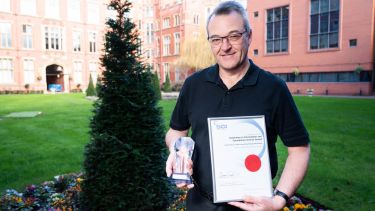Revolutionising vehicle efficiency with additive particle technology
There are 38.4 million cars on the road in the UK alone. Together they drive over 300 billion miles a year, pumping out tons of carbon dioxide as they go.

Despite advances in electric vehicles there are still barriers to the vision of a carbon-free transport network. In the meantime making our petrol and diesel car engines more efficient can help.
Designed to reduce friction and wear on moving parts, engine oil is the main source of lubrication in car engine and improving oil performance means a more efficient vehicle. This enables more miles to be travelled per gallon of fuel which therefore produces lower CO2 emissions. Professor Steven Armes and his research team at the University of Sheffield have been working closely with The Lubrizol Corporation, a world-leader in developing new engine oil technology, to produce a next generation lubricating engine oil formulated with a new additive technology.
“Traditionally, soluble polymers are added to engine oils to improve lubrication but unfortunately this approach thickens the oil in a similar way to corn starch thickening sauce,” explains Steve. “Thicker, more viscous oils means the engine has to work harder, which reduces its efficiency so you get fewer miles per gallon of fuel. Our idea was to add lubricating polymers to the engine oil that self-assemble into tiny rubber balls because this had the potential to minimise oil thickening,” continues Steve.
Armed with a growing knowledge of polymer self-assembly, Steve approached Lubrizol to suggest a joint research project in 2012. The aim was to explore whether this ‘rubber ball’ could be produced directly in engine oil on an industrial scale. Lubrizol agreed to fund a new PhD student, Matthew Derry, to work in Steve’s research group. Matthew developed a new process for producing these self-assembled polymers which has since been further optimised by Lubrizol. By conducting extensive testing the company has been able to confirm increased lubrication without associated oil thickening.
There are great benefits to this new engine oil, it has the potential to make cars more efficient, reducing the release of CO2 and particulates into the atmosphere.
Dr Tim Smith
Strategic Technology Manager, The Lubrizol Corporation
The collaboration between the University of Sheffield and Lubrizol is key to the success of this research. “One of the reasons we collaborate with universities is the knowledge, skills and networks of people they have. Steve and his team bring new ideas and we couldn’t do a development like this without him and his group,” says Tim. The significance of this collaboration has been recognised with the team winning the Society for Chemical Industry’s ‘Innovation and Formulation’ prize in January 2020 as well as Steven being announced the the 2021 Rideal Award winner.
The award is the culmination of eight years of hard work by Steve and his research team. The additive technology developed as a result of his close collaboration with The Lubrizol Corporation highlights the important role that academic and industrial partnerships can play in improving global air quality.
Further information
Professor Steven Armes, The University of Sheffield
Publications
Design principles for metamorphic block copolymer assemblies
For more information contact:
Emma Griffiths
Media and PR Assistant
University of Sheffield
0114 222 1034
e.l.griffiths@sheffield.ac.uk


